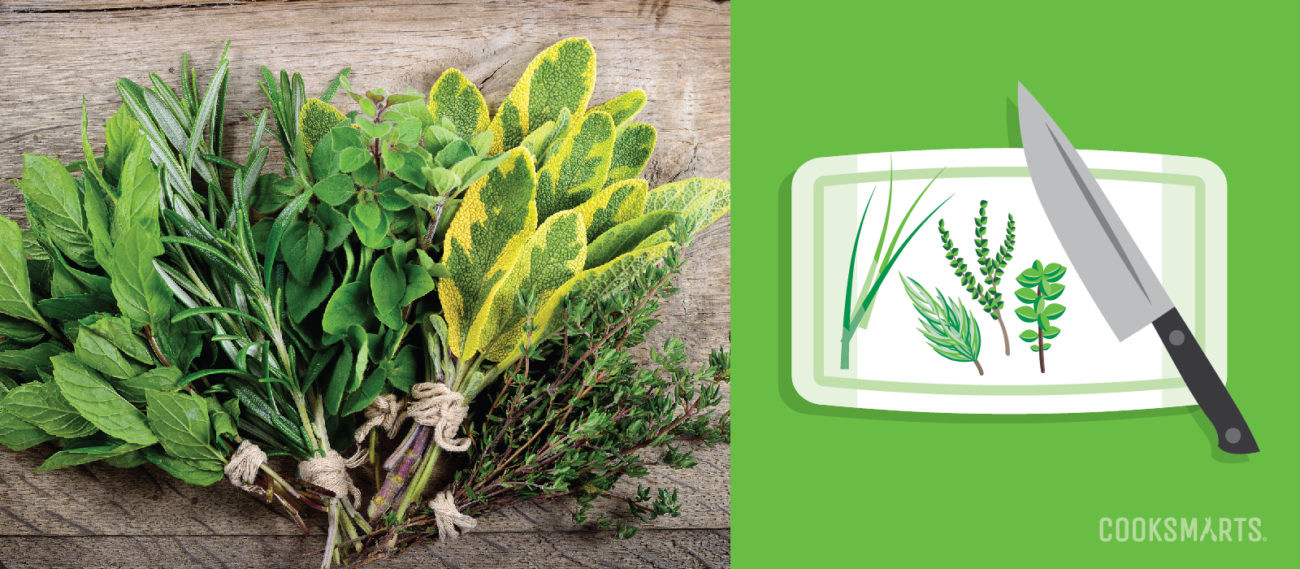Guide to Using Fresh Herbs
Fresh herbs add flavor and freshness to any meal. To help you get cooking with herbs to maximize flavor in all your dishes, we’ll cover all you need to know with our herbaceous tips and infographic guide.
This is part 5 of our ‘How to Maximize Flavor’ series. Read more about it here and see how you can become a flavoring pro and never cook a bland meal again!
When I started cooking, I relied on recipes to help me through the process. Although I was quite strict about following every instruction, I would typically leave out whatever herb the recipe called for. I was in college at the time and I couldn’t imagine that a few leaves could make a huge difference in a dish. Plus, they spoiled so quickly after I bought them.
However, as I’ve gained more cooking experience, I’ve discovered that a few leaves do make a difference!
Imagine bruschetta without basil or salsa without cilantro. These fresh herbs add prominent flavors to these foods and they just wouldn’t be the same without them.
To help you get cooking with herbs and teach you how to keep them fresh, this post will cover:
- Our Infographic Guide to Using Fresh Herbs
- When to use fresh herbs vs. dried herbs
- How to properly store herbs to make them last longer
- Our 3 tips for cooking with herbs
By the end, you’ll have lots of fresh herbaceous ideas!

Infographic Guide to Using Fresh Herbs
Since we got such positive feedback about our Spice Guide infographics, we also created a ‘Guide to Using Herbs’! This guide tells you the flavors of each herb and what herbs go best with certain foods. It also includes specific instructions for how to store herbs so they last longer.
You can get the Guide to Spices and Herbs eBook for just $9.99. It’s an amazing resource for adding so much flavor and freshness to all of your meals!
Guide to Flavoring with Fresh Herbs
Add flavor and freshness to your cooking.
Add flavor & freshness with our Guide to Herbs eBook
Our eBook teaches you how to cook with fresh herbs and properly store them.
If you’d like to get this infographic professionally printed to hang on your wall or fridge, check out our Shop, where a portion of our merchandise profits are set aside to support food education.
When to Use Fresh Instead of Dried Herbs
One of the greatest appeals of herbs is that fresh taste they add to a meal. When an herb is dried it loses many of the properties that give it that quality and the result is a more deep, concentrated flavor that tastes almost entirely different.
Because of this, some dishes work best with dried herbs and some work best with fresh herbs. Tweet this tip
Tender herbs such as basil, parsley and chives tend to taste better fresh since their subtle flavor is one of the most attractive qualities about them. Tougher herbs such as rosemary, oregano and thyme actually taste better when their flavors are more concentrated through the drying process.
Another factor to consider when choosing between fresh or dried herbs is time of cooking. Because fresh herbs have a more subtle taste, they are best added to dishes with a shorter cooking time. If a dish takes longer to prepare, make sure you add the fresh herb toward to end of cooking so it maintains its flavor. Dried herbs are ideal for longer cooking times because they release their flavors more slowly throughout the cooking process.
How to Store Fresh Herbs
It’s no fun buying expensive fresh herbs only to use them for one recipe and have them go bad in less than a week. This was one of the issues that deterred me from buying fresh herbs in my earlier cooking years. But don’t give up on them just yet.
When stored properly, fresh herbs can actually last up to several weeks. Tweet this tip
There are two methods depending on the herb:
1. “Planting” Method
- Trim the base of the stems with scissors or a knife
- Fill a jar (an old condiment jar works great) about ⅓ to halfway with cold water
- Place the cut stems into the water
- Cover the jar with a plastic bag
- Secure with a rubber band at the base of jar to enclose the bag around the jar
- Place the “planted” herb in the fridge or leave it out on the countertop depending on the herb (see infographic for specification)
- See it in action with this video here:
How to Store Herbs
Learn how to store herbs so that they'll stay fresher longer and last you for many recipes.
2. Towel Method
- Wrap the herbs in a damp paper towel
- Put the wrapped herbs in a Ziploc bag
- Place the herbs in the fridge
3 Tips for Cooking with Herbs
- Growing your own herbs is easy and can help keep the cost down. We love these tips for growing an indoor herb garden from the blog My Life and Kids.
- Use a sharp knife or herb scissors when chopping fresh herbs so they cut rather than crush the delicate herb leaves. Crushing leads to bruised, blackened herbs.
- If you’d like to use fresh herbs instead of dried herbs in a recipe, add 3-4 times more fresh herbs than the recipe calls for and add it in at the end.
We hope this guide and tips help you add flavor and freshness to your cooking. Remember, a few leaves really do make a difference in transforming and enhancing the flavor of a meal, so bring on the herbs!
If you think this information is handy, please help us spread the smarts by sharing it!
GET ALL THE INFO BELOW DELIVERED TO YOUR INBOX FOR FREE
Week 1: Our 3 Simplest Flavoring Secrets
Week 2: Spice Up Your Cooking with Our Spice Charts
Week 3: A Study of Flavor Profiles
Week 4: 5 Sauces You Can Use on Everything
Week 5: Keep it Fresh with Herbs (that’s this week!)
Week 6: Using Aromatics to Add Depth
Week 7: Surprise Giveaway!
